AP – Has there been a more satisfying actor to watch mature on screen in recent years than Dev Patel? The endearingly earnest, scrawny kid of Slumdog Millionaire has steadily grown into a singularly intense and sensitive leading man. It’s a transformation that, for anyone who missed Lion, The Personal History of David Copperfield or The Green Knight, may be especially jarring in watching Patel’s new film, Monkey Man.
Like Slumdog Millionaire, the film is set in Mumbai and has a touch of fable to it. But in tone and texture, it could hardly be more different. Bathed in blood and fury, Monkey Man is one gory coming out party for Patel, who also directed and co-wrote the film. He kicks so much behind in this movie – at one point he punches a punch – that it’s enough to make you wonder if the search for the new James Bond ought to be redirected.
Monkey Man, produced by Jordan Peele, is aiming for something grittier, though – more in Bruce Lee territory or the neighbourhood of Park Chan-wook’s Oldboy – wild, kinetic places to be where martial-arts action turns mythic and feverish. At its best moments, Monkey Man does that tradition justice.
But at all its moments, the movie is a convincing display of Patel’s still-expanding power and tenacity as a performer.
Monkey Man is most explosive in its blistering first half-hour. Patel’s character, credited only as Kid, fights while wearing a gorilla mask in an underground boxing ring. Our first image of him is of his head, in that mask, hitting the canvas hard.
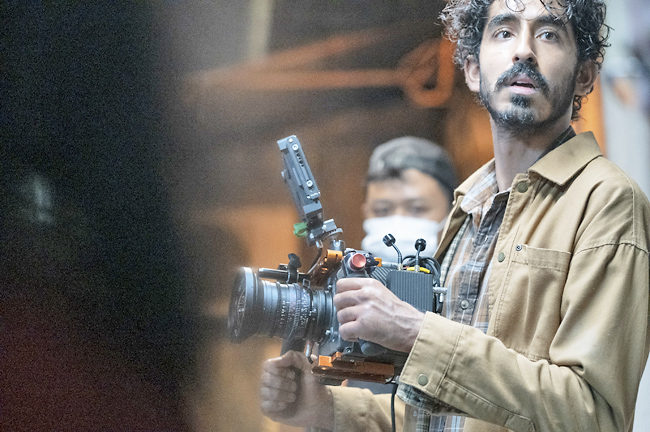
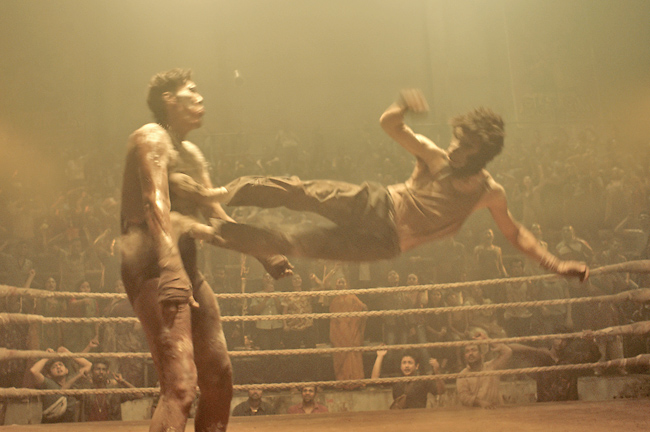
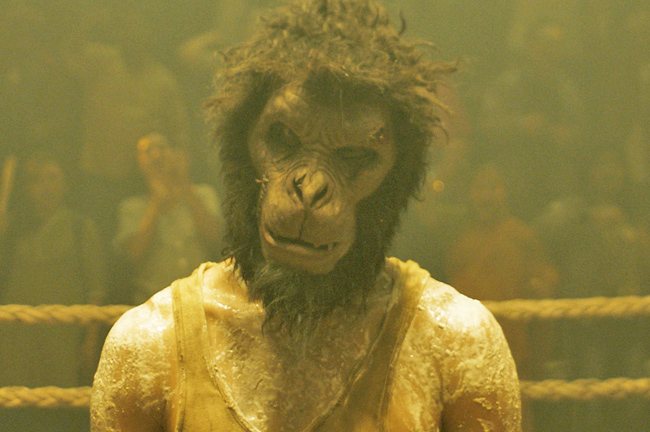

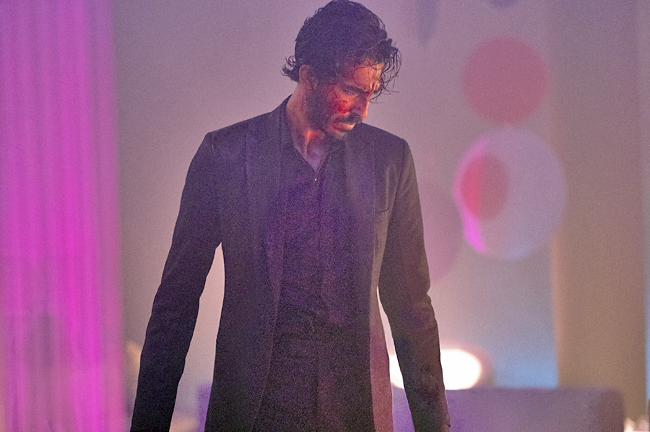
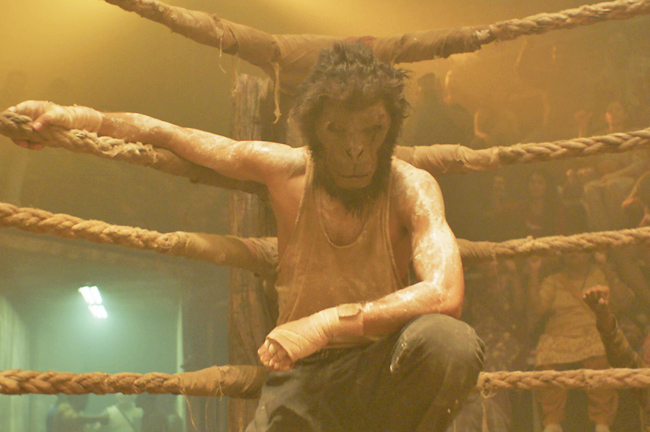
These scenes, presided over by Sharlto Copley’s ring leader, have a masochist edge to them, as does Kid’s corresponding efforts to get closer to a den of power and corruption housed in the high-rise King’s Club.
We don’t know initially the reasons for his obsession; he’s a mysterious, single-minded figure compelled by hellbent revenge.
And we watch with curiosity as he works his way into the building as a dishwasher hired by manager Queenie (Ashwini Kalsekar) and, soon thereafter, gains a promotion to waiter to get himself up to the penthouse.
His focus is on the police chief Rana (Sikandar Kher) and the build-up to their brutal first encounter is a swiftly edited, kinetic swirl. It fails, sending Kid on a clattering cascade down the building and beyond. Out of the frying pan, into a den with the axe-wielding maniac.
But while Monkey Man is thrillingly enigmatic at first, it’s overly leaden with exposition once it settles in. To its credit, the movie has other things on its mind. It opens with the Hindu epic poem Ramayana, in which the deity Hanuman mistakes the sun for a mango and has his powers stripped.
Monkey Man is sketched symbolically against the story of Hanuman but set in a sordid, contemporary Mumbai (technically it’s a fictional city named Yatana). The syndicate Kid is trying to infiltrate ultimately leads to a religious leader (Makarand Deshpande).
Monkey Man, which Netflix dropped before it was picked up by Peele and Universal, is pointedly political in its fictionalised echoes of modern, Modi-led India.
While Kid recovers with the help of the sage Alpha (Vipin Sharma) and a group of women in hiding, these elements are slowly brought from a simmer to a boil.
Monkey Man makes room for cutaways to TV news reports (some footage comes from real demonstrations) and copious flashbacks to a violent land grab from Kid’s childhood, during which his mother Neela (Adithi Kalkunte) was brutally murdered.
The real-world metaphors and Hindu contexts of Monkey Man add to the film’s potency but aren’t always smoothly incorporated.
This is a movie that namechecks John Wick, too.
And it’s more successful in its frenetic fight choreography leading up to a bloody third-act showdown imbued with the rage of class uprising.
But regardless of any incongruities, Monkey Man makes for a forceful directorial debut from Patel.
More than anything else, he brings a compelling gravity to a film that is quite serious about getting seriously brutal.
BEVERLY HILLS (AP) – Dev Patel first pitched Monkey Man as “a revenge film about faith”.
“Faith can be such a beautiful, powerful thing. It can bring us together. At its best, it should make us fight for each other instead of fighting against each other,” said Patel, who is making his feature directorial and screenwriting debut with the action thriller.
Monkey Man was inspired by the legend of Hanuman – a deity revered for his strength, loyalty and courage.
Patel said that he saw a lot of parallels between Hindu mythology and the iconography of the superheroes that we know of today, like Superman.
The film centres on a character named Kid – played by Patel – who makes a living working in an underground fight club and who later seeks to avenge his mother’s horrific death by infiltrating the elite class of a Mumbai-like city.

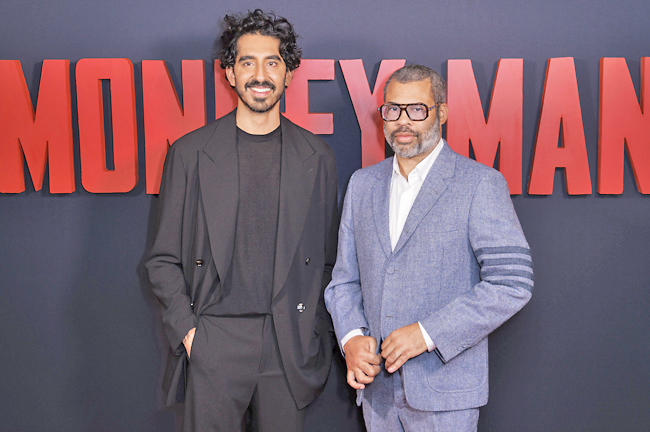
“Every day I’ve prayed for a way to protect the weak,” Kid says in a scene from the film’s trailer. Throughout the film, we learn that his mission extends beyond his family.
Patel’s character becomes a symbol of freedom, seeking justice for those who have been oppressed and displaced in the name of power, money and religion.
“The iconographies, the stories, the morals of right and wrong and courage, there’s this duality to it.” Patel said.
The Oscar-nominated British actor grew up inspired by action heroes like Bruce Lee and fell in love with action films at a young age.
“I was like, ‘I can use a genre that I love so dearly to talk about the caste system’,” he said. “It came from a place of rage too, against what was happening in India. And it happens everywhere, really.”
In addition to the fraught topic, the directorial debut was beset with challenges during production, including the coronavirus pandemic-driven shutdown, limited crew members and a series of physical injuries.
“I broke my hand, I broke my foot, I tore my shoulder. Everything that could have possibly gone wrong in the making of this film did go wrong,” he told reporters at SXSW. “And it’s really been a humbling experience.”
Sharlto Copley, who plays Tiger, said Patel went through an unusual discomfort during the filming process.
“I’m just filled with gratitude, really,” Copley said. “I keep saying to Dev, it’s like this grace that helped us through this one.” After surviving the gruelling production process, the film was dropped by Netflix.
“The studio that first acquired it, they didn’t really know what they’d bargained for,” Patel said. “The actual film itself is a lot denser and it’s saying a lot. Let’s say that it’s not your usual action scene on page one, and then you continue fighting non-stop. It’s trying to do a bit more.”
It was “just sitting there gathering dust”, Patel said. He was ready to let it go when Oscar-winning writer and director Jordan Peele – and founder of Monkeypaw Productions – swooped in to save the day, purchasing the film through his production partnership with Universal Pictures.
“He saw me as a filmmaker. He saw the pain I’d been through,” recalled Patel. “He said, ‘I hope you don’t mind. I’ve shared it with Universal and we’re going to buy it’. I literally – I fell off my seat.”
For Peele, Monkey Man reminded him of the ‘80s and ‘90s, when “movies were good”.
“It was iconic. I felt passionately that it was demanding to be on the big screen,” Peele said. “I could immediately see that this was a director who had gone through lengths and pushed and pushed and pushed because it really makes it to the screen. I mean, you have a film that is just absolutely huge, and the story of it is really intoxicating.”
Monkey Man received a standing ovation at its SXSW premiere. Video shows Patel standing on stage, moved to tears.
“I did cry. I couldn’t help it, man. You feel so raw up there, and the response was just magical,” he said.
After investing so much time into this debut, Patel said it was a quote from the legendary writer Rabindranath Tagore his father shared with him that finally allowed him to let go and release Monkey Man to the masses. “It’s something about ‘I’ve spent many days stringing and unstringing my instrument. And the song I came to sing remains unsung.’ Something like that,” Patel said.





